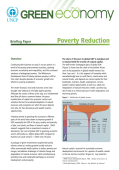This report analyses the social dimensions of the Republic of Macedonia's green growth strategy using a Participatory Scenario Development (PSD) methodology. The report provides a summary of the major challenges faced by the Republic of Macedonia in terms of social-economic development, demographic development and climate change, future development scenarios, with breakdowns by sector, and recommendations with respect to green growth strategy development. The report is part of the World Bank's support to the Macedonian government through the "FYR Macedonia Green Growth and Climate Change Analytic and Advisory Support Program".
The Development Co-operation Report is the key annual reference document for statistics and analysis on trends in international aid. This year, the Development Co-operation Report 2012 seeks to provide insights into how to address today’s sustainable development challenges, with a focus on inclusiveness and good governance to ensure that our finite resources are equitably distributed, now and in the future. Sharing finite resources among a growing number people – and consumers – is a critical challenge.
By identifying successful experiences of social dialogue on environmental policy, the report at hand presents practices, challenges and opportunities in developing and strengthening an efficient social dialogue on environmental issues at national, supranational, subnational and sectoral level. The report, produced with the support of Sustainlabour, intends to promote a stronger interaction among governments, workers’ and employers’ organizations in an increasingly challenging area for the world of work: environment, green economy and sustainable development.

Extreme poverty persists in large parts of the world despite decades of economic growth and efforts for poverty eradication. The recent financial, food and economic crises have brought new setbacks in the fight against poverty. Initiatives aimed at greening the economy in different parts of the world have been shown to improve the quality of life, stocks and flows of natural capital, and GDP, especially the GDP of the poor.
Sustainable construction provides opportunities to address and alleviate several challenges and needs currently experienced in Gaza, including the increasing housing demand, limited availability of construction materials, insufficient energy and water provision, inadequate sanitation, as well as severe unemployment. The assessment analyses the feasibility, opportunities and challenges relating to sustainable construction in relation to the above mentioned needs and explores ways to promote green jobs.
